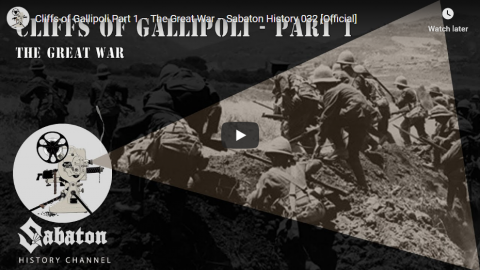The Great War
Published on 13 Sep 2019Signup for your FREE trial to The Great Courses Plus here: http://ow.ly/F9LC30po9ux
The Great Courses Plus is currently available to watch through a web browser to almost anyone in the world and optimized for the US, UK, and Australian markets. The Great Courses Plus is currently working to both optimize the product globally and accept credit card payments globally.
The Treaty of Versailles between the Allies and Germany was only one of the peace treaties that followed the defeat of the Central Powers. The new Austrian republic, one of the countries that emerged from the collapse of the Austro-Hungarian Empire, also tried to get a favorable deal with the Allies in Paris in 1919. Like Versailles, the The Treaty of Saint-Germain caused an outcry across the country.
» SUPPORT THE CHANNEL
Patreon: https://www.patreon.com/thegreatwar
Merchandise: https://shop.spreadshirt.de/thegreatwar/»CREDITS
Presented by: Jesse Alexander
Written by: Jesse Alexander
Director: Toni Steller & Florian Wittig
Director of Photography: Toni Steller
Sound: Toni Steller
Editing: Toni Steller
Mixing, Mastering & Sound Design: http://above-zero.com
Motion Design: Christian Graef – GRAEFX
Maps: Daniel Kogosov (https://www.patreon.com/Zalezsky)
Research by: Jesse Alexander
Fact checking: Florian WittigChannel Design: Alexander Clark
Original Logo: David van StepholdA Mediakraft Networks Original Channel
Contains licensed material by getty images
All rights reserved – Real Time History GmbH 2019
September 15, 2019
Worse Than Versailles? – The Treaty of Saint-Germain I THE GREAT WAR 1919
Why the national polls are, at best, only a rough guide to voters’ intentions
Canadian elections have their own quirks — historical, geographical, linguistic — that cannot be accurately captured in national opinion polls:
Conservative support is heavily concentrated in Alberta and Saskatchewan. Tens of thousands of its votes are therefore likely to be wasted racking up massive majorities in a relatively small number of seats.
The Liberal vote, by contrast, is more efficiently distributed, notably in Quebec, with its tight three- and four-way races, where a winning candidate might slip through with 30 per cent of the vote or less. So even though the Liberals are projected to win fewer votes than the Conservatives, they are also projected to win a solid plurality of the seats — perhaps even a majority.
Then again, the polls are misleading in another way. A poll can project, with some uncertainty, the level of support for the various parties among the voting-age population. It is a more difficult matter to predict what proportion of each party’s supporters will actually turn out to vote. The Liberals benefited in 2015 from a surge in turnout, especially among younger voters, on the strength of Justin Trudeau’s sunny idealism. No such enthusiasm, or idealism, is detectable this time around.
It all makes for a close, unpredictable race. The Liberal challenge is the usual one: to round up the vote on the left without giving too much ground on the centre, appealing to those tempted to vote NDP or Green not to split the progressive vote lest the Tories get in.
The Conservatives, for their part, will also be fighting a two-front war, with the emergence of the People’s Party to their right imposing some constraint on their ability to reach across the centre. To date the PPC has not posed much of a threat — its support has stalled at around 3.0 per cent — but it is not impossible that it could break out of that range now that voters are paying more attention.
Of course, Maxime Bernier being actively excluded from the debates, and the pollsters often not including a choice for the PPC will also limit the PPC’s visibility to ordinary Canadian voters. Oddly, this may benefit the Milk Dud and his “Conservatives”, as the media tries to ignore Bernier’s party but gives disproportional coverage to the Green and NDP campaigns, which potentially weakens support for Trudeau and the Liberals.
Update, 16 September: I guess the media finally noticed that excluding Maxime Bernier from the debates was a sub-optimal idea for their preferred winner (Justin Dressup).
The Leaders' Debates Commission (@debats_can) has invited @MaximeBernier to the Commission’s debates on October 7 and 10 #cdnpoli https://t.co/1ZGAZRO7KU
— Power & Politics (@PnPCBC) September 16, 2019
Turn a wood bowl WITHOUT a chuck
Rex Krueger
Premiered 3 hours agoMore video and exclusive content: http://www.patreon.com/rexkrueger
Get my woodturning book: http://www.rexkrueger.com/book
T-shirts, Hoodies and Plans: http://www.rexkrueger.com/storeTools and Materials in this Build (affiliate) || Hot Glue Gun: https://amzn.to/2YbLqYi
Sorby Bowl Gouge: https://amzn.to/2K2M6tU
Face Shield: https://amzn.to/2Y1dpij
Crown Round-Nose Scraper: https://amzn.to/2Y6bx2Z
Parting Tool: https://amzn.to/2OaZIc0
Titebond 3 Glue: https://amzn.to/2JW9rxzFollow me on Instagram: @rexkrueger
QotD: “Whenever I hear the word ‘culture’ I reach for my Browning”
This, attributed to Goering but rather indited by some other nutjob mediocrity, is among my favourite phrases. Often I cite it with glee. I know just what he meant; rarely has one the chance to empathize with Nazis. Monsters they were, but also human, and if we lose the means to recall what made them tick, we are disadvantaged against their successors.
Ditto with Islamic terrorists, incidentally. Unless we can see them, sometimes, from the angle that makes them most attractive, we miss the whole picture. Know the enemy, I say. The worst psychopath may offer to share some droll humour. It is my firm belief that even liberals and progressives can be charming, sometimes.
I wonder which part of Mr Browning’s works Herr Goering would reach for? Would it be an earlier work, as Paracelsus or Sordello? A later, such as Jocoseria or Asolando? Me, I think I would start with a dilatory romp through the Dramatic Idylls, then hunker down with The Ring and the Book.
David Warren, “Include me in”, Essays in Idleness, 2017-08-30.
September 14, 2019
Stalin’s 5 Year Plan for Economic Mass Murder | BETWEEN 2 WARS I 1932 Part 1 of 4
TimeGhost History
Stalin has to deal with the consequences of forcibly changing the Soviet Union from an agrarian economy into a modern industrialized society as his first five-years plan reaches its final year.
Join us on Patreon: https://www.patreon.com/TimeGhostHistory
Hosted by: Indy Neidell
Written by: Spartacus Olsson and Naman Habtom
Directed by: Spartacus Olsson and Astrid Deinhard
Executive Producers: Bodo Rittenauer, Astrid Deinhard, Indy Neidell, Spartacus Olsson
Creative Producer: Joram Appel
Post-Production Director: Wieke Kapteijns
Research by: Naman Habtom
Edited by: Daniel Weiss en Wieke Kapteijns
Sound design: Marek KaminskiA TimeGhost chronological documentary produced by OnLion Entertainment GmbH.
From the comments:
TimeGhost History
1 hour ago (edited)
Debating the concepts, definition and framework of Marxism, Communism and Socialism is something that historians don’t seem to get enough of, much like applying these theories to historical and contemporary phenomena. The study of how these theories turned into ideology and what effect that had on nations, cultures, peoples and wars is a very interesting field of history, which can be debated to great lengths, which we ourselves also like to engage and participate in. However, we want to once again emphasise that we will only allow debate within the generally accepted rules of academic debate. Keep it civil, substantiated, name your sources whenever possible and stay away from pseudo-science and contemporary politics. We are fierce believers in the benefits of academic debate and don’t want to resort to turning off the comments, as other channels might do when talking about subjects like the 5-year plan or the Holodomor.Cheers, Joram
Apocrypha: WW1 Tour Sneak Peek
Forgotten Weapons
Want to see all of my Apocrypha behind-the-scenes videos? They are a perk for Patrons who help directly support Forgotten Weapons:
http://www.patreon.com/ForgottenWeapons
Cool Forgotten Weapons merch! http://shop.bbtv.com/collections/forg…
I partnered up with Military Historical Tours to guide a World War One battlefield tour this week, and I figured I’d give you a bit of a peek into it. We are looking at the war chronologically, starting with a day in Belgium to look at the German attack in 1914, visiting the remains of Fort de Loncin in Liege and the Mons cemetery. Next was a day in Ypres for the stagnation into trench warfare in 1915, seeing the Dodengang up on the Yser and then the Bayernwald trenches, Passchendaele Museum, and Kitchener’s Wood. The year of 1916 marks two of the huge Western Front offensives, and we took one day on the Somme (Beaumont-Hamel and Lochnagar Crater) and a day at Verdun (Driant’s command post and tomb, Fort Vaux, Fleury Village, and the Douaumont Ossuary). Today we move to the Chemin des Dames to look at the disastrous French Nivelle Offensives at the Plateau de Californie and the Caverne du Dragons, and tomorrow we will see the arrival of significant American forces and the Hundred Days Offensive the ended the war, through the sites of Les Mares Farm, Belleau Wood, and Blanc Mont. We have a great group of people along, and it’s been a lot of fun, if quite sobering at times. I hope to see you on a future tour!
Contact:
Forgotten Weapons
6281 N. Oracle #36270
Tucson, AZ 85704
Good and bad news on the RCMP
The good news: someone in the RCMP was actively working on foreign intelligence.
The bad news: that someone was allegedly working for foreign intelligence:
According to sources, RCMP HQ Director General of the intelligence unit, Cameron Ortis was arrested in Ottawa under the secrets act for alleged espionage by foreign powers.
The arrest occurred on September 12 in Ottawa after an extensive national security investigation.
One insider called the allegations “serious spy s**t.”
The RCMP allege that Ortis allegedly had stolen “large quantities of information, which could compromise an untold number of investigations.”
How Does It Work: Lever Delayed Blowback
Forgotten Weapons
Published on 11 Jul 2019http://www.patreon.com/ForgottenWeapons
Cool Forgotten Weapons merch! http://shop.bbtv.com/collections/forg…
Lever-delayed blowback is a relatively uncommon action system, although it is applicable to a wide variety of firearms and has been successfully used in submachine guns, rifles, and light machine guns. It uses a principle of mechanical disadvantage on a fulcrum lever to force a mass to accelerate rearward while the bolt remains closed. This allows the effective weight of the moving parts to be amplified, resulting in a lighter firearm.
Contact:
Forgotten Weapons
PO Box 87647
Tucson, AZ 85754
QotD: America and its army
Before 1939 the United States Army was small, but it was professional. Its tiny officers corps was parochial, but true. Its members devoted their time to the study of war, caring little what went on in the larger society around them. They were centurions, and the society around them not their concern.
When so ordered, they went to war. Spreading themselves thinner still, they commanded and trained the civilians who heeded the trumpet’s call. The civilians did the fighting, of course — but they did it the Army’s way.
In 1861 millions of volunteers donned blue or gray. Millions of words have been written on American valor, but few books dwell on the fact that of the sixty important battles, fifty-five were commanded on both sides by West Pointers, and on one side in the remaining five.
In 1917 four million men were mustered in. Few of them liked it, but again they did things the way the professionals wanted them done.
The volunteers came and went, and the Army changed not at all.
But since the Civil War, the Army had neither the esteem nor the favor of public or government. Liberal opinion, whether business-liberal or labor-liberal, dominated the United States after the destruction of the South, and the illiberal Army grew constantly more alienated from its own society.
In a truly liberal society, centurions have no place. For centurions, when they put on the soldier, do not retain the citizen. They are never citizens to begin with.
There was and is no danger of military domination of the nation. The Constitution gave Congress the power of life or death over the military, and they have always accepted the fact. The danger has been the other way around — the liberal society, in its heart, wants not only domination of the military, but acquiesence of the military toward the liberal view of life.
Domination and control society should have. The record of military rule, from the burnished and lazy Praetorians to the juntas of Latin America, to the attempted fiasco of the Légion Étrangére, are pages of history singularly foul in odor.
But acquiesence society may not have, if it wants an army worth a damn. By the very nature of its mission, the military must maintain a hard and illiberal view of life and the world. Society’s purpose is to live; the military’s is to stand ready, if need be, to die.
Soldiers are rarely fit to rule — but they must be fit to fight.
The military is in essence a tool, to be used by its society. If its society is good, it may hope to be used honorably, even if badly. If its society is criminal, it may be, like the Wehrmacht, unleashed upon a helpless world.
But when the Wehrmacht dashed against the world, it was brought to ruin, not by a throng of amateurs, but by well-motivated, well-generaled Allied troops, who had learned their military lessons.
T.R. Fehrenbach, This Kind of War: A Study in Unpreparedness, 1963.
September 13, 2019
“Cliffs of Gallipoli” Part 1 – The Great War – Sabaton History 032 [Official]
Sabaton History
Published on 12 Sep 2019While the British were already dying by the thousands in the trenches in Western Europe, their high command decided to try to break the stalemate with an attack on the Ottoman Empire in the Dardanelles. This is the first episode on the Sabaton song “Cliffs of Gallipoli” about the Allied landings on the shores off Gallipoli.
Support Sabaton History on Patreon: https://www.patreon.com/sabatonhistory
Listen to The Art of War (where “Cliffs of Gallipoli” is featured):
CD: http://bit.ly/TheArtOfWarStore
Spotify: http://bit.ly/TheArtOfWarSpotify
Apple Music: http://bit.ly/TheArtOfWarAppleMusic
iTunes: http://bit.ly/TheArtOfWariTunes
Amazon: http://bit.ly/TheArtOfWarAmz
Google Play: http://bit.ly/TheArtOfWarGooglePlayWatch the Official Lyric Video of “Cliffs of Gallipoli” here: https://www.youtube.com/watch?v=oOCe2…
Hosted by: Indy Neidell
Written by: Markus Linke and Indy Neidell
Directed by: Astrid Deinhard and Wieke Kapteijns
Produced by: Pär Sundström, Astrid Deinhard and Spartacus Olsson
Creative Producer: Joram Appel
Executive Producers: Pär Sundström, Joakim Broden, Tomas Sunmo, Indy Neidell, Astrid Deinhard, and Spartacus Olsson
Maps by: Eastory
Edited by: Iryna Dulka
Sound Editing by: Marek KaminskiEastory YouTube Channel: https://www.youtube.com/channel/UCEly…
Archive by: Reuters/Screenocean https://www.screenocean.com
Music by Sabaton.Sources:
– IWM: Q 57165, Q 1309, Q 515124, Q 13550, Q 13411, Q 53319, Q 13297, Art. IWM ART 4279, Q 112876, IWM ART 2452
– Photos of Ottoman Cavalry courtesy of the National Library of Israel
– Archives New Zealand
– New Zealand troops landing at Gallipoli taken by Joseph McBrideAn OnLion Entertainment GmbH and Raging Beaver Publishing AB co-Production.
© Raging Beaver Publishing AB, 2019 – all rights reserved.
From the comments:
Sabaton History
2 days ago (edited)
Thats right, “Cliffs of Gallipoli” will be featured in not one but two Sabaton History episodes! The next episode will dive into a different but equally perspective of the battle.Joakim already mentions it in the call to action of this episode, but we’re making Sabaton History Special Editions of all the older Sabaton albums, just like we did with The Great War. Those who support us at a certain level on Patreon before the end of November will be rewarded with the Sabaton History Edition of the Sabaton album Heroes. Check out our Patreon page to find out more! -> https://www.patreon.com/sabatonhistory
Cheers!
The new German populists – Alternative für Deutschland (AfD)
Sabine Beppler-Spahl discusses the rise of Alternative für Deutschland:

“AfD Election Poster” by harry_nl is licensed under CC BY-NC-SA 2.0
Germany is just two months away from commemorating the 30th anniversary of the fall of the Berlin Wall. But for many commentators, east and west Germany are more divided than ever. The success of the right-wing Alternative für Deutschland (AfD) in the recent state elections in Brandenburg and Saxony has fueled this concern. The AfD came second in both elections. In Brandenburg, it won 23.5 per cent of the vote, just 2.7 per cent below the ruling centre-left SPD. In Saxony, it won 27.5 per cent of the vote, 4.6 per cent behind the incumbent centre-right CDU. “When I, a Wessi [west German], leave Berlin … I see nothing but right-wingers … These are people whose sensitivities I don’t understand… Thirty years after the fall of the wall, there is still no unity”, said a writer for Der Spiegel.
Many in the east are just as keen as their western counterparts to distance themselves from AfD voters. The “most important message” from Saxony’s election result was that the “friendly Saxony” had won, said Michael Kretschmer, the state’s CDU minister president. As if reading from the same script, Brandenburg’s minister president, the SPD’s Dietmar Woidke, emphasised that “the face of Brandenburg would remain friendly”. Of course, “friendly” is a code word for mainstream or pro-establishment. But presenting the elections in these terms may have helped the governing parties to their narrow victories. Some analysts suggest that voters, who would otherwise have opted for the Greens or Die Linke (the Left Party), supported the ruling parties for fear of the AfD coming first.
The debate about the east-west divide is deeply anti-political. It focuses solely on the question of what is wrong with east German voters – and the roughly one million AfD voters in particular – rather than on what has gone wrong with German politics as a whole. As a result, there is a great deal of snobbery in the discussion. For Brigitte Fehrle, former editor of the left-liberal Berliner Zeitung, the AfD‘s success can be explained by a mixture of voters’ “disappointment” and their “unrealistic expectations about what is possible in politics”. Sociologist Cornelia Koppetsch, author of a bestselling book on right-wing populism, describes AfD voters as a “cross-section of globalisation’s losers”. This is despite research finding that people who voted for the AfD in 2017 don’t see themselves as “losers” of globalisation at all, and even rate their personal economic situation as above average. That AfD voters might simply hold different political values or views on climate policy, immigration and the family is rarely considered.
[…]
The established parties have ceded ground to the AfD by refusing to take it seriously. Instead of engaging AfD representatives in as many debates as possible, they have relied on trying to expose the party’s far-right connections. For instance, the AfD leader in Brandenburg has been accused of joining a Neo-Nazi demonstration in Greece in 2007. Though these accusations are not trivial by any means, they have only helped to strengthen the impression among AfD supporters that the established parties prefer to vilify the party morally, rather challenge it politically.
Ultimately, the desire for political change is not limited to east Germany. If the mainstream parties continue to be complacent, all voters will look elsewhere. On this front at least, the east and west might be closer than suspected.
No-Fuss Finishing for Wood
Rex Krueger
Premiered 6 hours agoMore video and exclusive content: http://www.patreon.com/rexkrueger
Get the FREE Tip Sheet: https://www.rexkrueger.com/articles/2…
Finishing Supplies in This Video (affiliate) || Shellac: https://amzn.to/2N10o27
Denatured Alcohol: https://amzn.to/2zYaQyZ
(For thinning Shallac and cleanup.)
Oil-Based Satin Poly: https://amzn.to/34EDuDw
(I used Varthane in the video, but I usually use Minwax. I don’t see a difference between them.)
Mineral Spirits: https://amzn.to/315soFc
(They call this “odorless,” but it’s not.)
Boiled Linseed Oil: https://amzn.to/31f0pTu
Paste Wax: https://amzn.to/2HSlL1w
Steel Wool (0000/Super-fine): https://amzn.to/2A0Cf3c
Micro-Fiber Cloths: https://amzn.to/2HSFxKm
(My favorite for buffing out final finishes and wax)
Foam Brushes: https://amzn.to/2UCb9Jp
(For poly/linseed oil ONLY. DO NOT USE with Shellac).
Nylon Brush: https://amzn.to/2zVWgIp
(Not the one I used but looks the same. Rated for all finishes.)See the Woodwork for Humans Series: https://www.youtube.com/watch?v=3FKyz…
Woodwork for Humans Tool List (Affiliate):
Stanley 12-404 Handplane: https://amzn.to/2TjW5mo
Honing Guide: https://amzn.to/2TaJEZM
Green buffing compound: https://amzn.to/2XuUBE2
Cheap metal/plastic hammer for plane adjusting: https://amzn.to/2XyE7Ln
Spade Bits: https://amzn.to/2U5kvML
Metal File: https://amzn.to/2CM985y (I don’t own this one, but it looks good and gets good reviews. DOESN’T NEED A HANDLE)
My favorite file handles: https://amzn.to/2TPNPpr
Block Plane Iron (if you can’t find a used one): https://amzn.to/2I6V1vh
Vaughn Bear Saw: https://amzn.to/2WoIzLP
Dewalt Handsaw: https://amzn.to/2IAHX1Z
Stanley Marking Knife: https://amzn.to/2Ewrxo3
Mini-Hacksaw: https://amzn.to/2QlJR85T-shirts, Hoodies and Plans: http://www.rexkrueger.com/store
Get my woodturning book: http://www.rexkrueger.com/book
Follow me on Instagram: @rexkrueger
NDP leader Jagmeet Singh gets his tax plans vetted by the Parliamentary Budget Office
A recent innovation for political campaigns is that they can ask the Parliamentary Budget Office to provide an estimate for the impact of any taxation proposals, and NDP leader Jagmeet Singh was the first out of the gate to have his “super-wealth tax” evaluated. The PBO estimates that the levy would net out some $6 billion in the first full year of implementation. Sounds like a lot of money! Colby Cosh explains why it’s not quite what it might seem:

Federal NDP leader Jagmeet Singh taking part in a Pride Parade in June 2017 (during the leadership campaign).
Photo via Wikimedia.
Alas, the bean-counters always swoop in to spoil things. Singh’s wealth-tax scheme is instructive not only because he availed himself of PBO costing, but because it usefully reveals the limits of what the PBO or any other economic modeller can do. Look, in other words, at the fine print.
The PBO’s job was to estimate what you can extract from “an annual net wealth tax on Canadian resident economic families equal to one per cent of net wealth above $20 million.” In the PBO model this is a simple multiplication, but the roughly $6 billion take is arrived at only by reducing the revenue by 35 per cent to correct for “behavioural response” — that is, lawful (and unlawful) tricks employed to avoid the new tax by the rich targets. The net revenue is what’s left after you deduct another two per cent to cover administrative costs.
And, as the PBO immediately insists, “the estimate has high uncertainty” on both counts. This means they’re educated guesses. Jennifer Robson, a social policy prof at Carleton University’s Arthur Kroeger College, pointed out on Twitter that right now we don’t tax economic families per se and we don’t report assets and debts routinely to Revenue Canada. Ideas for pure wealth taxation (which is rare in practice) are predicated on the creation of, essentially, a new tax system — one which would have to detect and perpetually update how much, for example, the furniture in your house costs. The 35 per cent loss from behavioural response is at the high end of historic estimates from real-world examples. Even within our current tax system, Robson observes, we only get two extra dollars for every one we spend on expanding collections and compliance against the existing tax base.
As a practical matter, a wealth tax would mostly be, or would act most efficiently as, a tax on bank balances and investment accounts. Of course, there is always real estate. The super-rich seem to have a lot of that, and it is relatively easy to tax, and the resentment of Torontonians and Vancouverites who don’t own some is, for better or worse, a major reason the NDP is trying to weaponize envy.
But this reminds us that property taxes and taxes on property transfers perform a similar function, although they are not used primarily for income redistribution as such here — and in Canada ours are relatively high. The OECD does a little league table of tax structures, and compared with other industrialized countries Canada’s take from property taxes is about double the average. In a 36-country list we are near the bottom (33rd) in our dependence on taxing goods and services, and about average (12th) in dependence on corporate taxation, but fifth highest in dependence on personal taxation — and third in dependence on property taxes.
Why You Wouldn’t Want to Fly The First Jet Airliner: De Havilland Comet Story
Mustard
Published on 1 Dec 2017Air travel before the Jet Age wasn’t always glamorous. The relentless noise and vibration from a piston powered propeller aircraft often made long flights even more exhausting. Most aircraft also couldn’t fly high enough to avoid bad weather, so air sickness was more common.
After World War Two, as part of an effort to develop its civil aviation industry, Britain stunned the world by unveiling the world’s first jet airliner. The de Havilland Comet was sleek, quiet, and flew higher and faster than any airliner of the day. As piston propeller technology was reaching its limits, the conventional thinking was that jet engines were too unreliable and produced too little power relative to their fuel consumption. But the de Havilland Comet proved that jet travel was the future. When the Comet entered service in 1952, it immediately began breaking travel time records and became a point of national pride for Britain.
The de Havilland Comet was perhaps little too ahead of its time. With such a clean sheet design, there were still lessons to learn. When early Comets suffered from catastrophic depressurization incidents, the entire fleet was grounded and their Certificate of Airworthiness was revoked. Flaws in the design of the aircraft’s fuselage were resolved in later Comet versions. However, the rest of the world was now catching up, and manufacturers including Boeing and Douglas began to offer their own jet airliners. While later version Comets served airlines reliably, they were outsold by competing aircraft. There’s no question However, that the comet paved the way. The British had taken a massive risk and brought the world into the jet age. #DeHavilland #CometAirliner #Airplane
Want to help Mustard grow? Support us on Patreon: https://www.patreon.com/MustardChannel
QotD: Orwell’s campaign against the jackboot
In spite of my campaign against the jackboot — in which I am not operating single-handed — I notice that jackboots are as common as ever in the columns of the newspapers. Even in the leading articles in the Evening Standard, I have come upon several of them lately. But I am still without any clear information as to what a jackboot is. It is a kind of boot that you put on when you want to behave tyrannically: that is as much as anyone seems to know.
Others besides myself have noted that war, when it gets into the leading articles, is apt to be waged with remarkably old-fashioned weapons. Planes and tanks do make occasional appearances, but as soon as an heroic attitude has to be struck, the only armaments mentioned are the sword (“We shall not sheathe the sword until”, etc., etc.), the spear, the shield, the buckler, the trident, the chariot and the clarion. All of these are hopelessly out of date (the chariot, for instance, has not been in effective use since about A.D. 50), and even the purpose of some of them has been forgotten. What is a buckler, for instance? One school of thought holds that it is a small round shield, but another school believes it to be a kind of belt. A clarion, I believe, is a trumpet, but most people imagine that a “clarion call” merely means a loud noise. One of the early Mass Observation reports, dealing with the coronation of George VI, pointed out that what are called “national occasions” always seem to cause a lapse into archaic language. The “ship of state”, for instance, when it makes one of its official appearances, has a prow and a helm instead of having a bow and a wheel, like modern ships. So far as it is applied to war, the motive for using this kind of language is probably a desire for euphemism. “We will not sheathe the sword” sounds a lot more gentlemanly than “We will keep on dropping block-busters”, though in effect it means the same.
One argument for Basic English is that by existing side by side with Standard English it can act as a sort of corrective to the oratory of statesmen and publicists. High-sounding phrases, when translated into Basic, are often deflated in a surprising way. For example, I presented to a Basic expert the sentence, “He little knew the fate that lay in store for him” — to be told that in Basic this would become “He was far from certain what was going to happen”. It sounds decidedly less impressive, but it means the same. In Basic, I am told, you cannot make a meaningless statement without its being apparent that it is meaningless — which is quite enough to explain why so many schoolmasters, editors, politicians and literary critics object to it.
George Orwell, “As I Please” Tribune, 1944-08-04.














